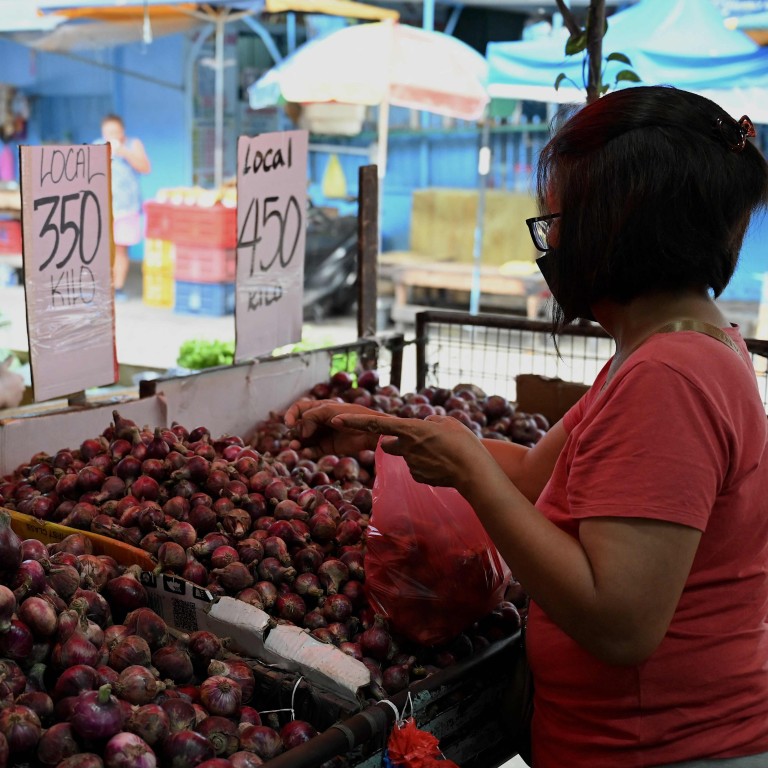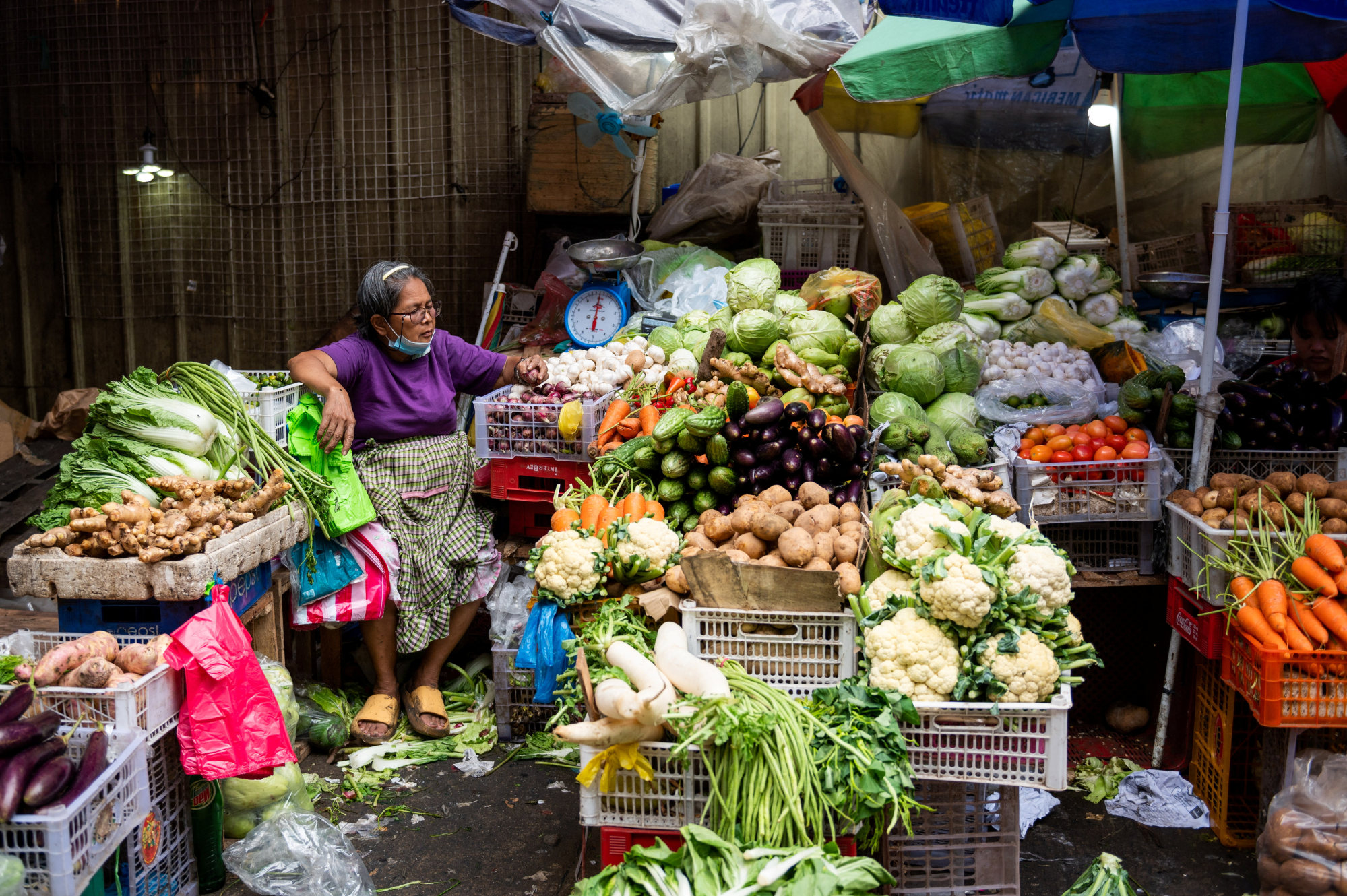
Philippine farmers say China produce smugglers to blame as onion prices soar higher than steak
- Smugglers have taken advantage of rising food prices and the public’s desperation, with local farmers suffering crop and profit losses
- Authorities have vowed to investigate a ‘cabal of Chinese nationals and their associates’ who they say control agricultural smuggling
It was supposed to be a routine phone call from the leader of a farmers’ cooperative about the sorry plight of Filipino vegetable growers affected by rampant smuggling of produce from China.
But the once-vocal opponent of smuggling on the other end of the telephone line told Ernesto Ordoñez – co-founder of Alyansa Agrikultura, a nationwide coalition comprising 32 federations of farmers and fisherfolk – of being “scared” and giving up the fight after receiving death threats.
“These threats are serious. They might kill,” Ordoñez told This Week in Asia.
Soaring prices force Philippines to plan import of 1 month’s worth of onions
A combination of typhoons, pest infestations, and high fertiliser and fuel costs led to the current onion shortage, which has been exacerbated by traders hoarding supplies and farmers lacking the necessary equipment to preserve last year’s harvest.
The Philippines’ Bureau of Customs recently seized more than 153 million pesos (US$2.8 million) worth of red and white onions smuggled from China that were originally declared to be fish balls.
Congressman Joey Salceda, who heads a committee with oversight of anti-smuggling efforts, earlier said he would investigate the “cabal of Chinese nationals and their associates … this mafia [that] is in control of agricultural smuggling in the country at every stage of the smuggling process, from transport to arrival, to import permits and sanitary inspection.”
“Intelligence sources tell us that the main characters are Chinese, or their associates,” he said in a statement. “The tentacles are all over, but I am told that it is a small group, so if we can get to the core group, we should be able to pin the system down.”
Raul Montemayor, national manager of the Federation of Free Farmers (FFF), said smuggling was a lucrative business that only benefited a select few. “Many grow rich [because of smuggling], but not the consumers and farmers,” he said.
A 2020 study by the Taipei-based Food and Fertiliser Technology Centre found some US$1.96 billion worth of milled rice, US$448 million of refined sugar, US$428 million of beef, and US$295 million of onions were smuggled into the Philippines between 1986 and 2009.

This Week in Asia compared two databases to examine the extent of smuggling. In 2021 alone, the Philippine Statistics Authority (PSA) recorded a total of US$26.8 billion worth of imports from China. However, the United Nations International Trade Statistics Database, which compiles import and export data of countries, recorded US$57.31 billion worth of Chinese exports to the Philippines that year – a difference of US$30.51 billion.
China’s agricultural and fish exports to the Philippines, minus fruits and nuts, totalled US$138 million, or 6.8 billion pesos, according to the UN trade statistics. However, the PSA only recorded 773.6 million pesos (US$14 million) of agricultural imports from all countries, including China, in 2021.
Inflation looks set to stay. What are Asean economies doing about it?
Smuggling, a perennial problem in the Philippines, is done in two ways. There’s “outright smuggling”, where goods are sneaked into the country without paying customs duties, and “technical smuggling” that’s done through “undervaluation”, which sees the value of goods either understated, misclassified or declared to be something else, he said.
The FFF said December 2021 customs data on rice imported from Vietnam showed the government lost 4 billion pesos (US$72.6 million) worth of tariff duties because customs inspectors misclassified the imported rice as lower quality. The imported rice then flooded the market to compete with local rice, which cost more because of higher fuel and fertiliser prices.

Last year, farmers from the highland province of Benguet pleaded with senators to stop the rampant smuggling of carrots from China and prevent Korean strawberries from being misclassified by Customs as ornamental plants, which enjoy lower tariffs.
The farmers said because customers preferred Chinese carrots as they lasted longer, most of the Benguet carrots were dumped or given away by the tonne, resulting in losses running into millions of pesos.
Notable names included Davidson Bangayan, indicted for a rice trade monopoly in 2018 but later released on bail, “Onion Queen” Leah Cruz, Manuel Tan who specialised in smuggling agri-fishery produce, local mayor Jun Diamante and alleged meat smuggler Gerry Teves.
State officials implicated last year included Navotas City Mayor Toby Tiangco, a relative by marriage of Marcos Jnr, then-Customs Commissioner Rey Guerrero and two of his deputies, and then-Department of Agriculture undersecretary Ariel Cayanan.

Before assuming the presidency, Marcos Jnr had vowed that “we will run after all the smugglers [of agriculture produce]”. Senators presented him with the list in July last year, but smuggling has persisted.
Marcos Jnr’s elder sister, Senator Imee Marcos, previously said that smugglers were well known but had evaded arrest despite a 2016 law making smuggling a crime of economic sabotage.
Such complaints are not new. In 2002, then-President Gloria Macapagal-Arroyo told business groups who were pressuring her to curb smuggling that “we know who the smugglers are”.
Arroyo created the Anti-Smuggling Intelligence and Investigation Center that year, with Ordoñez appointed as its private sector representative. He said the group successfully reduced smuggling by 25 per cent because it had access to vital information and reported directly to Arroyo.
Two years later, Ordoñez said the centre was abolished after “we reported a favourite congressman and son of a cabinet secretary. I was quite upset”.
The new faces of hunger: inflation’s human cost, from Singapore to the Philippines
A “less powerful” anti-smuggling committee established by the next administration still managed to reduce smuggling by 31 per cent, Ordoñez said.
This changed when Duterte assumed office, the anti-smuggling committee was abolished and customs officials no longer shared data with the private sector. Smuggling ballooned once more, Ordoñez said.
“The government would allow imports to come in very cheap during harvest time, on top of what is being smuggled. It discourages farmers [from planting and innovating more],” he said.
Because of this, a movement representing small farmers, farm workers and peasants called Kilusang Magbubukid ng Pilipinas has asked the government to discuss the smuggling problem with the Chinese government and to provide “public cold storage facilities that onion farmers can access and use for free” as long-term solutions.
That way, farmers need not be forced to sell their crops to traders at giveaway prices, the group said.

